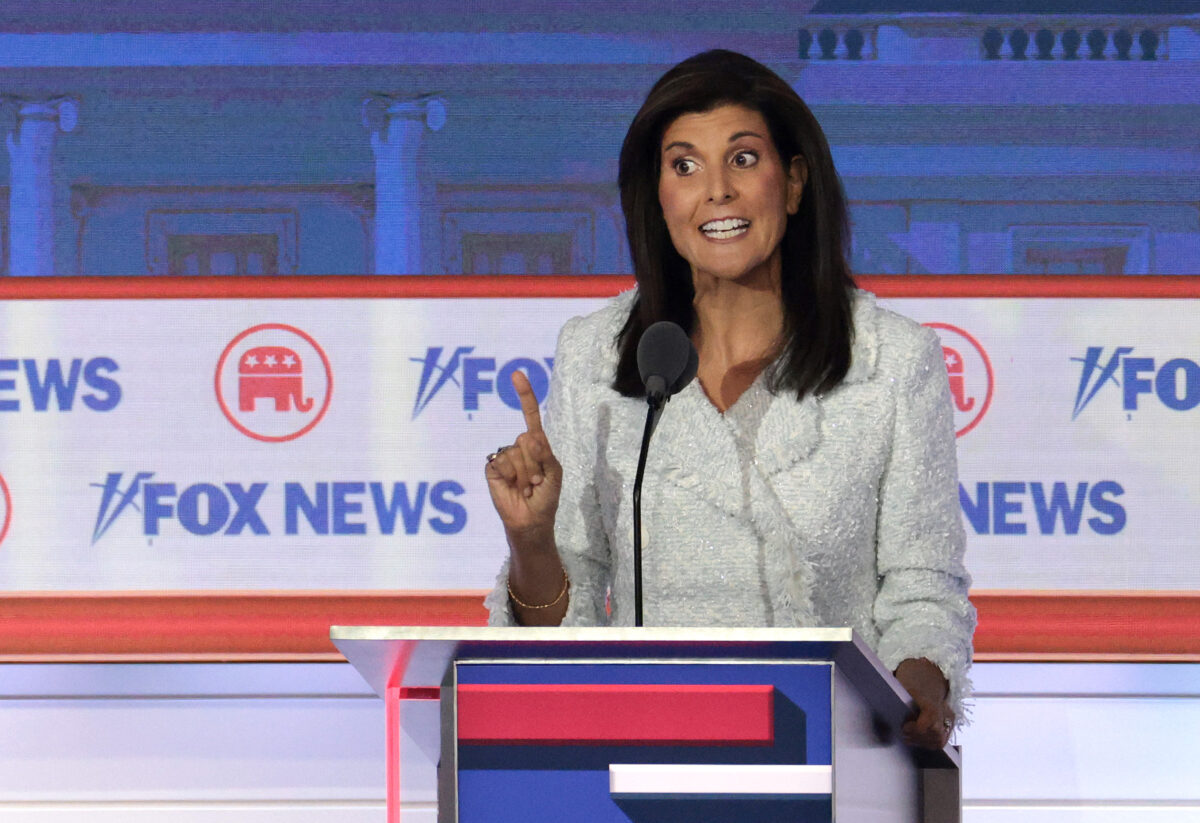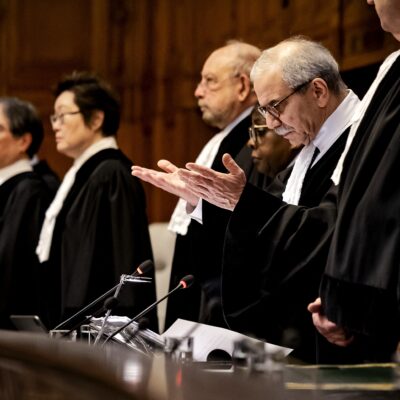Nikki Haley leans into fighting campus antisemitism ahead of RJC summit
The former U.N. ambassador is seeking to burnish her pro-Israel bona fides as the GOP primary field grows increasingly divided over foreign policy

Win McNamee/Getty Images
Republican presidential candidate, former U.N. Ambassador Nikki Haley participates in the first debate of the GOP primary season hosted by FOX News at the Fiserv Forum on August 23, 2023 in Milwaukee, Wisconsin.
LAS VEGAS — Former U.N. Ambassador Nikki Haley is speaking out against rising incidents of campus antisemitism ahead of a high-profile appearance at the Republican Jewish Coalition’s annual leadership summit in Las Vegas, where more than half a dozen presidential contenders will address donors at the Venetian Resort on Saturday.
In a series of recent media hits, Haley pledged to federally adopt the International Holocaust Remembrance Alliance’s working definition of antisemitism, which identifies some criticism of Israel as antisemitic, and said she would pull the tax-exempt status of universities that fail to enforce her proposed mandate.
“We do need to make sure on these college campuses that we hold these universities accountable,” Haley said in an interview on Newsmax on Thursday morning, adding: “If they’re not going to acknowledge the hate that’s on their campuses, I think their tax-exempt status needs to be revoked.”
Haley also accused the Biden administration of equivocating over the IHRA’s definition in its national strategy to combat antisemitism, which was released in May. The White House’s definition does not mention Israel, even as its broader strategy touches on instances where anti-Zionist rhetoric may overlap with anti-Jewish prejudice.
“You can’t fight antisemitism if you can’t define it,” Haley said in remarks to the New York Post published on Wednesday evening. “Joe Biden and the left refuse to call anti-Zionism antisemitism.”
In its strongest comments to date on campus antisemitism, meanwhile, the White House on Thursday forcefully denounced the “grotesque sentiments” and “antisemitic messages” of anti-Zionist demonstrations that are now proliferating on college campuses across the country amid the ongoing conflict between Israel and Hamas.
“Delegitimizing the State of Israel while praising the Hamas terrorist murderers who burned innocent people alive, or targeting Jewish students, is the definition of unacceptable — and the definition of antisemitism,” said Andrew Bates, a White House spokesperson. “President Biden is proud to have been an enemy of antisemitism and hate his entire life, and he always will be.”
In response, Haley claimed that the Biden administration, which has faced pressure to implement its strategy in recent months, still had not gone far enough in its efforts to fight antisemitism.
“Joe Biden still refuses to say anti-Zionism is antisemitism,” Haley reiterated in a statement to Jewish Insider on Thursday evening. “It’s time to tell the truth. Denying Israel’s right to exist and calling for Israel’s annihilation is just another form of antisemitism. You can’t fight antisemitism if you can’t define it.”
In addition to Haley, Gov. Ron DeSantis of Florida is also asserting himself on campus antisemitism issues as he prepares to deliver a speech at the RJC summit this weekend. On Tuesday, DeSantis announced that he was moving to crack down on Students for Justice in Palestine, which maintains chapters at two public universities in Florida, based on the group’s endorsement of Hamas’ terrorism.
DeSantis directed Florida’s Board of Governors, which oversees the state’s public university system, to send notices to the University of Florida and the University of South Florida “that their chapters are to be removed from campus immediately,” Jeremy Redfern, the governor’s press secretary, told JI earlier this week.
While legal experts have questioned whether the crackdown is constitutional, one pro-Israel leader involved in campus activism suggested to JI that DeSantis’ new order, which identifies SJP’s support for Hamas as a felony under Florida law, could be a model for elected officials seeking to confront the growing radicalism of the anti-Zionist left.
In recent days, DeSantis has also sought to burnish his pro-Israel credentials while touting efforts to help send military supplies to Israel and promoting an initiative to counter the Boycott, Divestment and Sanctions movement against the Jewish state.
Still, the governor has struggled to balance his commitment to Israel with the isolationist rhetoric he has invoked to voice skepticism of American support for Ukraine in its ongoing war against Russia.
During an interview with Newsmax this week, for instance, DeSantis indicated that he would not back additional U.S. aid to Israel in the aftermath of Hamas’ Oct. 7 terror attack — in contrast with Haley, who has vowed to give Israel “anything they need” as the GOP primary field grows increasingly divided over U.S. policy toward the Jewish state.
“I think we just need to be supportive of them publicly,” DeSantis told Eric Bolling on Tuesday. “I think privately we want to say, ‘Do what you gotta do.’ Yes, whatever ongoing military support we have with Iron Dome and all that, we should continue that. But I don’t think it’s going to be a situation where America’s going to need to take a lead in that. I don’t think we should. I don’t think it’s our war. I do think it’s Israel’s war.”
In another recent example of growing isolationist sentiment within the GOP, Sen. Tim Scott (R-SC) said on Sunday that he would vote against a potential aid package bundling U.S. assistance to Israel and Ukraine, even as he has expressed support for funding both countries.
Former President Donald Trump has also drawn scrutiny in recent weeks for criticizing Israeli Prime Minister Benjamin Netanyahu and calling Hezbollah “very smart,” as he told supporters in West Palm Beach, Fla., earlier this month.
While Trump and his allies have sought to walk back his initial remarks, his comments are likely to be a source of friction at the RJC summit, where the former president is expected to make a rare appearance alongside his rivals. A spokesperson for Chris Christie told JI that there was “no doubt” the former New Jersey governor would be highlighting Trump’s statements on Israel in his own speech on Saturday.
No candidate, however, has bucked Republican orthodoxy on Israel more than Vivek Ramaswamy, the anti-woke entrepreneur who has aggressively embraced the isolationism of the right. Earlier this week, for instance, he rejected sending additional military aid to Israel as it continues its counteroffensive in Gaza.
“In my ideal view of this, Israel should be able to make the decisions of how it defends itself and its national self-existence,” Ramaswamy, who is also scheduled to speak at the RJC summit, told Axios on Tuesday. “And we provide a diplomatic Iron Dome for Israel to be able to carry that out. And that’s it. No money.”
Ramaswamy’s positions have faced backlash from several rivals, especially Haley, who blasted his statements on Israel during the first Republican debate in August. “You have no foreign policy experience,” she told the GOP upstart, “and it shows.”
It remains to be seen if Haley will renew that line of attack in her speech at the high-profile donor confab on Saturday, particularly as Ramaswamy’s popularity has recently fallen after a brief polling surge.
But even as Haley has continued to demonstrate her support for Israel since the inaugural debate, some Republican Jewish donors have suggested that her performance this summer was a crucial moment that helped solidify her position as the pro-Israel favorite in a fractious primary field.
“She made Israel a point,” one prominent GOP donor in Chicago, who asked to remain anonymous to protect his privacy, told JI a few days after the first debate. “She seems to be the only one who cares.”










